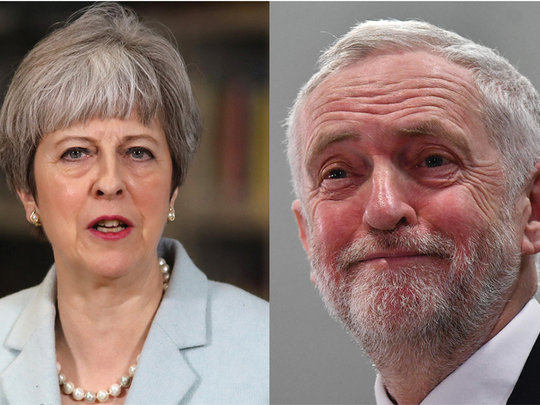
‘Crunch time is coming for the prime minister,” Keir Starmer, Labour’s Brexit spokesman, tells the BBC’s Andrew Marr. But, then again, when isn’t it? Prime Minister Theresa May is more familiar with crunch time than an overworked gravel salesman. What gives force to Starmer’s claim is that the ordeal now facing the prime minister is of a different order and character to the daily miseries that have afflicted her since the general election last June. Ostensibly a principled challenge by Labour leader Jeremy Corbyn to her position on Brexit, it is really a ruthless political challenge to her position, full stop.
Corbyn’s long-standing ideological recoil from the EU and the unrelenting pressure from Euro-sceptic Labour MPs and some of his closest advisers, may do the needful.
So don’t expect a tearful declaration that he does, after all, love Big Brussels. There has been no epiphany, no sudden volte-face. Yes, his mind has been focused by the risk of a hard border between Northern Ireland and the Republic of Ireland and the consequent mortal threat to the Good Friday agreement. But the shift he is about to announce is primarily political rather than doctrinal in inspiration.
The potential to cause havoc in the Commons was demonstrated by the success in December of Conservative politician Dominic Grieve’s amendment to the European Union withdrawal bill giving MPs a legally guaranteed vote on the Brexit deal. But there are only so many procedural issues upon which Labour can join forces with remainer Tories if the bombardment is to be sustained.
This is what Corbyn is doing. By shifting the needle even slightly on the question of a future customs arrangement with the EU, he will — at a stroke — create the germ of a cross-party rebel alliance bound not only by an insistence on the supremacy of the Commons but also by shared policy values. This is a hugely significant moment.
With ever greater clarity, it is dawning upon Labour strategists that there may indeed be a “Corbyn moment” — which is to say, a limited period of maximum electoral opportunity. For an opposition, there is always a case for playing it long, campaigning in more locations, fleshing out the difference you will make to sceptical voters. But time can be a foe as well as a friend — never more so than in the capricious age of novelty politics and fickle social media.
Last summer belonged to Corbyn, in mood, tone and electoral trajectory. But volatility, by definition, destroys that which it creates. So what are Corbyn’s options now? He can hold tight and wait for this jerry-rigged government to collapse under the weight of its own contradictions. Or he can strike.
The first option is proving risky, as May’s lonely talent appears to be a capacity to turn her party’s confusion and indecision to her advantage. The cabinet’s commitment last week to pursue a Brexit deal based upon “ambitious managed divergence” is yet another tribute to her dreary genius. The wording is completely meaningless in all respects — except that it has extended the Tory truce a little longer.
And this is what May does; all she does, in fact. She leads by procrastination. She insists upon inaction. She is the woman ordering endless Ubers to take her to the place where she already stands.
The alternative option for the Labour leader is to force the pace, and to do so in parliament. In 1992-93, John Smith paved the way for Tony Blair’s victory by tactical alignment over the Maastricht treaty with the Tory Euro-sceptic — a Commons rebellion that did terrible damage to John Major’s authority.
A quarter of a century later, Corbyn has a comparable opportunity to make common cause with the Tory remainers: not always, but often enough to tip the Conservative tribe from paralysis to panic. His new position on the customs union is meant to light the fuse that leads — however circuitously — to a confidence vote in the PM and another general election. It is not a strategy without peril. It could fail, and embarrassingly so. But it is still, as Michael Corleone would say, the smart move.
— Guardian News & Media Ltd
Matthew d’Ancona is a noted columnist.







